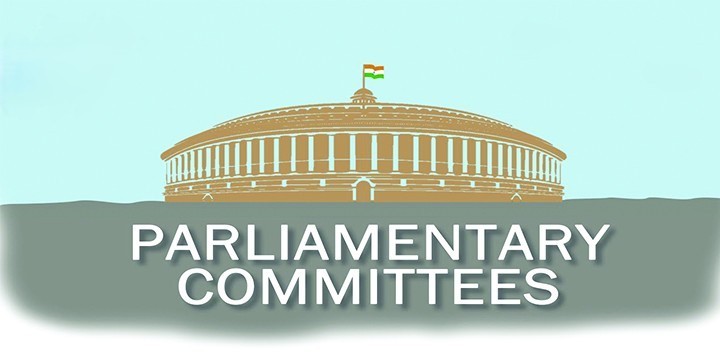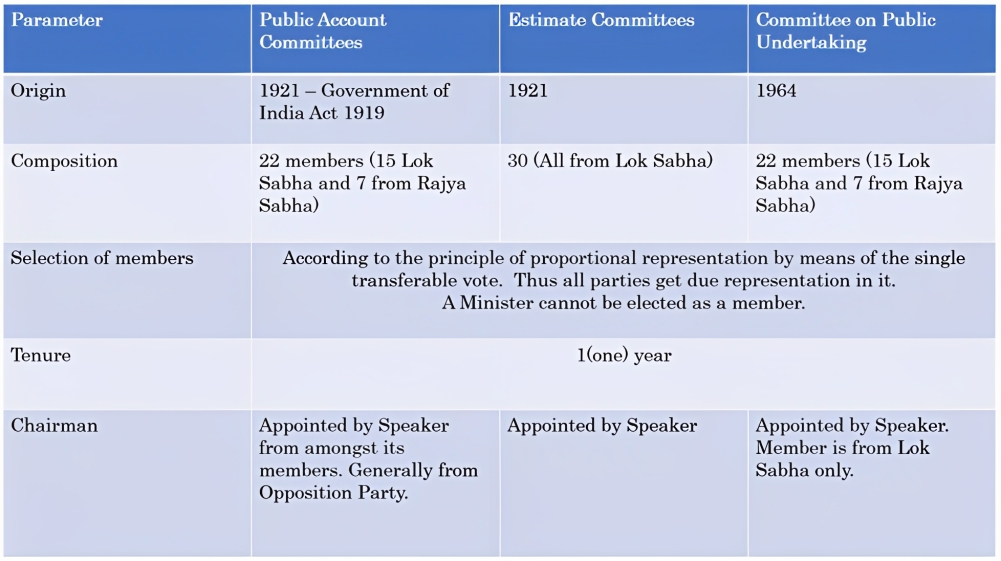Description

Copyright infringement not intended
Context: Due to the vast volume of information and the scope of operations that the Indian Parliament is needed to carry out, it is not possible to debate all matters on the floor of the House. Parliamentary committees are formed to explore deeper into public issues and develop an expert opinion.
Parliamentary Committees
About
- Parliamentary committees are an integral component of the workings of the Indian Parliament.
- They are constituted by the House or appointed by the Speaker or Chairman to assist the Parliament in a variety of ways, including scrutinising bills, evaluating budgets, overseeing ministries, and studying particular problems.
- Parliamentary committees aid in improving the quality of legislation, increasing executive responsibility, and strengthening the role of the opposition.

Evolution of Parliamentary Committees
- The origin of parliamentary committees can be traced back to the British Parliament, which influenced the Indian Constitution.
- The committees in India were formed by the Constituent Assembly to deal with various aspects of drafting the Constitution, such as citizenship, tribal and excluded areas, and fundamental rights.
- However, a structured committee system was only established in 1993 when 17 department-related standing committees (DRSCs) were created to examine the demands for grants of various ministries and departments.
- Later, more DRSCs were added, bringing the total number to 24.
- These committees cover almost all the ministries and departments of the central government and have 31 members each (21 from Lok Sabha and 10 from Rajya Sabha).
- Apart from DRSCs, other standing committees deal with financial matters, such as the Public Accounts Committee, the Estimates Committee, and the Committee on Public Undertakings.
- These committees examine the accounts, budgets, and performance of various public sector enterprises and government agencies.
- They have 22 or 30 members each, depending on their composition.
- The role and importance of parliamentary committees have increased over time as they provide a platform for detailed discussion, expert consultation, public participation, and consensus building on various matters of national interest.
- They also enhance the accountability and transparency of the executive branch and strengthen the legislative oversight function of Parliament
Types of Parliamentary Committees
About
- There are two types of parliamentary committees: Standing or permanent committees and ad hoc committees.
- Standing committees are constituted for a fixed term and work continuously. Ad hoc committees are created for a specific purpose and are dissolved after they complete their task.
- There are 6 categories of standing committees: financial committees, departmental standing committees, committees to inquire, committees to scrutinize and control, committees relating to the day-to-day business of the House, and house-keeping or service committees.
- There are 2 categories of ad hoc committees: inquiry committees and advisory committees.
Financial committees
- They are responsible for examining the financial affairs of the government and ensuring that public money is spent wisely and effectively.
- There are 3 financial committees: Public Accounts Committee, Estimates Committee, and Committee on Public Undertakings.
- The Public Accounts Committee (PAC) examines the accounts of the Union government and reports on any irregularities or misappropriation of funds.
- The Estimates Committee examines the estimates of expenditure of various ministries and departments and suggests economies in public expenditure.
- The Committee on Public Undertakings (COPU) examines the working and performance of public sector enterprises and their compliance with statutory obligations.

Departmental standing committees
- They are responsible for examining the demands for grants, bills, annual reports, and long-term policies of various ministries and departments.
- There are 24 departmental standing committees covering all the ministries and departments of the central government.
Committees to inquire
- They are responsible for investigating specific matters of public interest or allegations of wrongdoing.
- There are 4 committees to inquire:
- Committee on Petitions
- Committee of Privilege
- Ethics Committee
- Joint Parliamentary Committee

Committees to scrutinize and control
- They are responsible for monitoring the actions of the executive and ensuring that it follows the rules and procedures laid down by the Parliament.
- There are 5 committees to scrutinize and control:
- Committee on Government Assurances
- Committee on Subordinate Legislation
- Committee on Papers Laid on the Table
- Committee on Welfare of SCs and STs
- Committee on Empowerment of Women
Committees relating to the day-to-day business of the House
- They are responsible for facilitating the smooth conduct of parliamentary proceedings and maintaining order and discipline in the House.
- There are 6 committees relating to the day-to-day business of the House:
- Business Advisory Committee
- Committee on Private Members' Bills and Resolutions
- Rules Committee
- Committee on Absence of Members from Sittings of the House
- General Purposes Committee
- Joint Committee on Offices of Profit.
House-keeping or service committees
- They are responsible for providing various amenities and services to the members of Parliament and ensuring their welfare.
- There are four house-keeping or service committees:
- House Committee
- Library Committee
- Joint Committee on Salaries and Allowances of Members.
- Joint Committee on Maintenance of Heritage Character and Development of Parliament House Complex
Ad hoc committees
- They are formed by either House or both Houses jointly to deal with specific issues that require urgent attention or expert opinion. They cease to exist after they submit their reports or when they are discharged by the House.
- Inquiry committees are formed to probe into matters of public importance or allegations of corruption or misconduct.
- Some examples of inquiry committees are Joint Committee on Bofors Contracts (1987), Joint Committee on Stock Market Scam (2001), Joint Committee on 2G Spectrum Allocation (2011), etc.
- Advisory committees are formed to advise the government or the Parliament on policy matters or legislative proposals.
- Some examples of advisory committees are the Select Committee on Prevention of Corruption Bill (2018), the Joint Select Committee on Personal Data Protection Bill (2019), etc.
Role of Parliamentary Committees
Scrutinising legislative proposals
- Parliamentary Committees help in scrutinising legislative proposals (Bills) in detail, which may not be possible on the floor of the House due to time constraints and political debates.
- They examine the Bills clause by clause, hear the views of experts and stakeholders, and suggest amendments or modifications to improve the quality of legislation.
Exercise oversight over the executive
- Parliamentary Committees also exercise oversight over the executive branch of the government.
- They monitor the implementation of laws and policies, examine the budgetary allocations and expenditures of various ministries and departments, and hold them accountable for their performance and outcomes.
Platform to engage
- Parliamentary Committees also provide a platform for members of Parliament to engage with domain experts, government officials, civil society organisations, and other stakeholders on various issues of public importance.
- They facilitate informed and evidence-based decision-making by the Parliament.
The interface between the Parliament and the people
- Parliamentary Committees also act as an interface between the Parliament and the people.
- They enable public participation in the legislative process by inviting suggestions and feedback from the public on Bills and other matters.
- They also disseminate information about the functioning of the Parliament and its committees to the public through their reports and other means.

Issues with Parliamentary Committees
Lack of adequate time
- Parliamentary Committees often have to deal with a large number of matters within a short period.
- This affects their ability to conduct thorough scrutiny and analysis of various issues.
Lack of adequate resources
- Parliamentary Committees lack adequate staff, research support, infrastructure, and funds to carry out their functions effectively.
- They also face difficulties in accessing relevant information and data from the government.
Lack of transparency
- Parliamentary Committees usually conduct their meetings in private and do not allow media or public access.
- Their reports are also not made public until they are tabled in the House. This reduces their accountability and visibility to the public.
Lack of enforceability
- Parliamentary Committees do not have any binding authority over the government or the House.
- Their recommendations are only advisory in nature and can be accepted or rejected by the government or the House. This reduces their impact and influence on policymaking.
Recommendations to improve Parliamentary Committees:
- Increase the time allotted for committee meetings and extend their tenure beyond one year.
- Provide adequate staff, research support, infrastructure, and funds to committees.
- Ensure timely access to relevant information and data from the government.
- Increase transparency by allowing media and public access to committee meetings and reports.
- Increase enforceability by making committee recommendations mandatory or requiring a reasoned response from the government or the House.
Way Forward
- Parliamentary committees provide better analysis and scrutiny of important issues that cannot be directly handled by the legislature due to their volume and complexity. They also monitor the functioning of the executive branch and act as an interface between the government and the people.
- Parliamentary Committees are vital organs of the Parliament that perform various functions that enhance its efficiency, accountability, and responsiveness. They need to be strengthened and empowered to fulfil their role more effectively and contribute to better governance in India.
|
PRACTICE QUESTION
Q. What are parliamentary Standing committees? Discuss their need and significance in Parliamentary democracy.
|

https://epaper.thehindu.com/ccidist-ws/th/th_delhi/issues/32327/OPS/G54B3SMHO.1.png?cropFromPage=true












